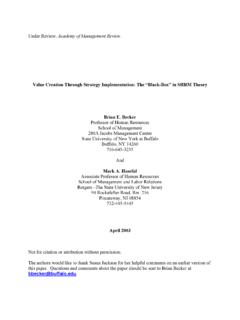Transcription of 7 Reasons Insurance Defense Lawyers Hate 30(b)(6 ...
1 7 reasons insurance defense lawyers hate 30(b)(6 ) Depositions in Trucking Cases Ken Shigley 1. Atlanta One of the most powerful tools available to plaintiffs' Lawyers in truck crash cases in the 30(b)(6 ). deposition of the trucking company. Used in conjunction with the records deposition of the corporation, it has been called the Death Star deposition. If all the stars align, a records deposition may strip away the filters that result from laziness, lack of motivation, dissembling and evasiveness, and the following corporate representative deposition may consist of creation of a series of sound bites of admissions and transparent evasions to play at trial. In keeping with the goal of securing the just, speed and expensive resolution of disputes, FRCP.
2 30(b)(6 ) / 9-11- 30(b)(6 ) authorizes depositions of organizations on topics designated by the party taking the deposition through representatives designated and prepared by the organization. A key purpose of Rule 30(b)(6 ), is [to] curb the bandying' by which officers or managing agents of a corporation are deposed in turn but each disclaims knowledge of facts that are clearly known to persons in the organization and thereby to [the organization]. 2. This deposition may be combined or coordinated with a records custodian deposition under FRCP. 30(b)(2) / 9-11-30(b)(5) in conjunction with a request for production under FRCP 34 /. 9-11-34. The nearly identical sources of authority are as follows: FRCP 30(b)(6 ) 9-33- 30(b)(6 ).
3 Notice or Subpoena Directed to an Organization. Deposition of organization. A party may, In its notice or subpoena, a party may name as the in his or her notice, name as the deponent deponent a public or private corporation, a a public or private corporation or a 1. President, State Bar of Georgia (2011-12); Chair-elect, American Association for Justice Motor Vehicle Collision, Highway & Premises Liability Section (2014-15); Lead author, GEORGIA LAW OF TORTS: TRIAL PREPARATION & PRACTICE. (West 2010-15); Certified Civil Trial Advocate, National Board of Trial Advocacy. 2. Fed. R. Civ. P. 30(b)(6 ) advisory committee's note to 1970 amendments (quoted favorably by In re Analytical Systems, Inc.)
4 , 71 408, 412 (Bankr. Ga. 1987)). partnership, an association, a governmental partnership or association or a agency, or other entity and must describe with governmental agency and designate with reasonable particularity the matters for reasonable particularity the matters on examination. The named organization must then which examination is requested. The designate one or more officers, directors, or organization so named shall designate one managing agents, or designate other persons who or more officers, directors, or managing consent to testify on its behalf; and it may set out agents, or other persons who consent to the matters on which each person designated will testify on its behalf, and may set forth, for testify.
5 A subpoena must advise a nonparty each person designated, the matters on organization of its duty to make this designation. which he or she will testify. The persons so The persons designated must testify about designated shall testify as to matters information known or reasonably available to the known or reasonably available to the organization. This paragraph (6) does not preclude organization. This paragraph does not a deposition by any other procedure allowed by preclude taking a deposition by any other these rules. procedure authorized in this chapter. FRCP 30(b)(2) 9-11-30(b)(5). Producing Documents. If a subpoena duces tecum Production of documents and things.
6 The notice to is to be served on the deponent, the materials a party deponent may be accompanied by a request designated for production, as set out in the made in compliance with Code Section 9-11-34 for subpoena, must be listed in the notice or in an the production of documents and tangible things at attachment. The notice to a party deponent may be the taking of the deposition. The procedure of Code accompanied by a request under Rule 34 to Section 9-11-34 shall apply to the request. produce documents and tangible things at the deposition. A. Materials for Study. Lawyers preparing to take corporate depositions would do well to study materials on point, including: QBE Insurance Corporation v.
7 Jorda Enterprises, Inc., 277 676 ( , 2012)(Appendix A - summarizes 39 rules for 30(b)(6 ) depositions). Otero v. Vito, 2006 WL 3535149 ( , 2006)(Judge Royal). Phillip H. Miller & Paul J. Scoptur, ADVANCED DEPOSITIONS STRATEGY & PRACTICE. (Trial Guides, 2013). David Malone, 30(b)(6 ) RULES: TALKING TO AN ORGANIZATION (NITA, 2013). Adam Blank, Five Strategies for Rule 30(b)(6 ) Depositions, Trial 40 (Aug. 2007), Michael R. Gordon and Claudia de Palma, Practice Tips and Developments in Handling 30(b)(6 ) Depositions, ABA Litigation Section, April 2014, Nathaniel S. Boyer, Going Rogue in a 30(b)(6 ) Deposition: Whether It's Permissible, and How Defending Counsel Should Respond, ABA Litigation Section, April 2012, ABA CIVIL DISCOVERY STANDARDS (2004), B.
8 Why Insurance Defense Lawyers Hate 30(b)(6 ) Depositions. Insurance Defense lawyer in unguarded moments may tell how much they hate 30(b)(6 ) depositions and wish the rule would be repealed. Here are seven Reasons why: 1. They have limited time to develop trust and cooperation necessary to prepare witnesses on the topics of the deposition. Except when involved in a rapid response team dispatched to the scene right after crash, Insurance Defense Lawyers may have their first contact with a trucking company, particularly a smaller one, sometime between service of process and filing of the answer. When it becomes necessary to respond to a 30(b)(6 ). notice, particularly early in the litigation, the Insurance Defense attorney at a disadvantage due to the need to quickly build rapport, educate the client about the seriousness of the procedure, and adequately prepare one or more corporate representatives to testify.
9 The corporate designee's testimony must encompass facts within the corporation's knowledge .. its subjective beliefs and opinions .. [and] its interpretation of documents and events.. Upon notification of a 30(b)(6 ) deposition, a corporation cannot take a laissez faire approach to the inquiry. That is, producing a designee and seeing what he has to say or what he can cover. A party does not meet his obligations under Rule 26 or 30(b)(6 ) by figuratively throwing up its hands in a gesture of helplessness.. Poole ex rel. Elliott v. Textron, Inc., 192 494, 504 ( ). While perfection is not required, it takes significantly more time and effort to adequately prepare for a well-defined 30(b)(6 ) deposition than for the typical deposition of an individual witness.
10 It is a significant challenge for an Insurance Defense lawyer representing a trucking company, particularly one that is small, unsophisticated and accident-prone, to handle this adequately in a short time. Once the deposing party carries its initial burden by serving the Rule 30(b)(6 ) notice stating with reasonable particularity the subject matter of the deposition, four duties are triggered that must be met by the organization. 3 First, the organization must designate an individual to speak for the organization in the deposition. 4 Second, if more than one individual is required to provide the necessary information to respond to the deposing party's stated subject matter, the organization has a duty to designate as many people as is reasonably necessary.






